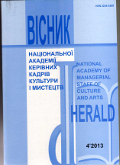Motive of travelling and tourism trips in ukrainian literature
DOI:
https://doi.org/10.32461/2226-3209.4.2013.138009Keywords:
travel, travel writing, tourism, culture, Ukrainian literatureAbstract
The article considers the motive of traveling and tourism trips in Ukrainian literature. Traced the evolution of the literary genre of travel and influence of Ukrainian literature about travelling to forming the idea of travel and tourism trips in Ukrainian culture. It is noted that actually pilgrimage literature, widely represented with genres of lives, walking, hagiography, which had many similarities with the itinerant notes become widespread in medieval and the first sight of itinerant Ukrainian prose is "The Life and walking of Danilo, hegumen of the Russian Land" (XII century). In the example of "Travels of the Patriarch Macarius" Pavel Khalebskiy shown the value of written traveling in Ukraine for exploring Ukraine by western reader and integrate Ukraine in European cultural space. Characterized one of the first Ukrainian authors of travel notes in the age of Enlightenment, which spawned such new social phenomenon as tourism, Vasily GrigorovichBarsky. Among Ukrainian writers of the romantic period, when the genre has reached especial development, noted Taras Shevchenko, M. Grabowski, P. Karmansky, I. Franko, M. Voronoy. The author believes that implementation traditions of traveling in thematic structure, genre and stylistic features, types of travelers image, going along with rethinking the idea of travel as a way of self-knowledge, perception of the world and change its default properties. Resistance of epic elements, focus on genres of essays, chronicles, developmentof poetic narrative manners, the use of role-subjective forms in the works of these authors enabling disclosure ideological and emotional features of the national system of life. Separate attention is drawn to poets who also successfully used traditional motifs of trip, including such motives as "farewell", anguish, forced travel, to reconstruct historically and national circumstances. Traced that from the late XIX – till early XX century, the travel theme is a leading both in western and in ukrainian literature, and with the appearance of modernism is changing its artistic concept. Since one of the main postulates of artistic modernism system was to move the event from outside plan to the inside plan, then, accordingly, travel also began to belong to the internal space. Precondition in development of travel topos directly in the prose of the twentieth century performing "wandering" publicism and numerous original artistic reinterpretation of "eternal" images, themes, motifs. In Ukrainian art prose of early twentieth century the motive of traveling is represented by artistic heritage of M. Kotsyubinsky, N. Kibalchich, H. Alchevska, Lesya Ukrainian. Particular attention is paid to the psychological novella of M. Kotsyubinsky "Dream", where evaluating characteristics of tourists, which are in contrast with idyllic autochthon images, creating colorful palette of collective images of world nations, and also the narrative of H. Alchevska "Rooted Branch" in what actually tourists, as an integral part of kapriy reality, originaly determined by the example of European womankind. Analysis of artistic works by these authors leads to the conclusion that it is no accidental that for creating collective image of different ethnic cultures writers have chosen travel topos as a model of cognition new worlds. Discovering new worlds, enriching theme-shaped thesaurus of Ukrainian prose writers, travelers get attracted them to a unified cultural field.Downloads
Published
Issue
Section
License
Authors who publish with this journal agree to the following terms:
1. Authors retain copyright and grant the journal right of first publication with the work simultaneously licensed under a Creative Commons Attribution License International CC-BY that allows others to share the work with an acknowledgement of the work's authorship and initial publication in this journal.
2. Authors are able to enter into separate, additional contractual arrangements for the non-exclusive distribution of the journal's published version of the work (e.g., post it to an institutional repository or publish it in a book), with an acknowledgement of its initial publication in this journal.
3. Authors are permitted and encouraged to post their work online (e.g., in institutional repositories or on their website) prior to and during the submission process, as it can lead to productive exchanges, as well as earlier and greater citation of published work (See The Effect of Open Access).


